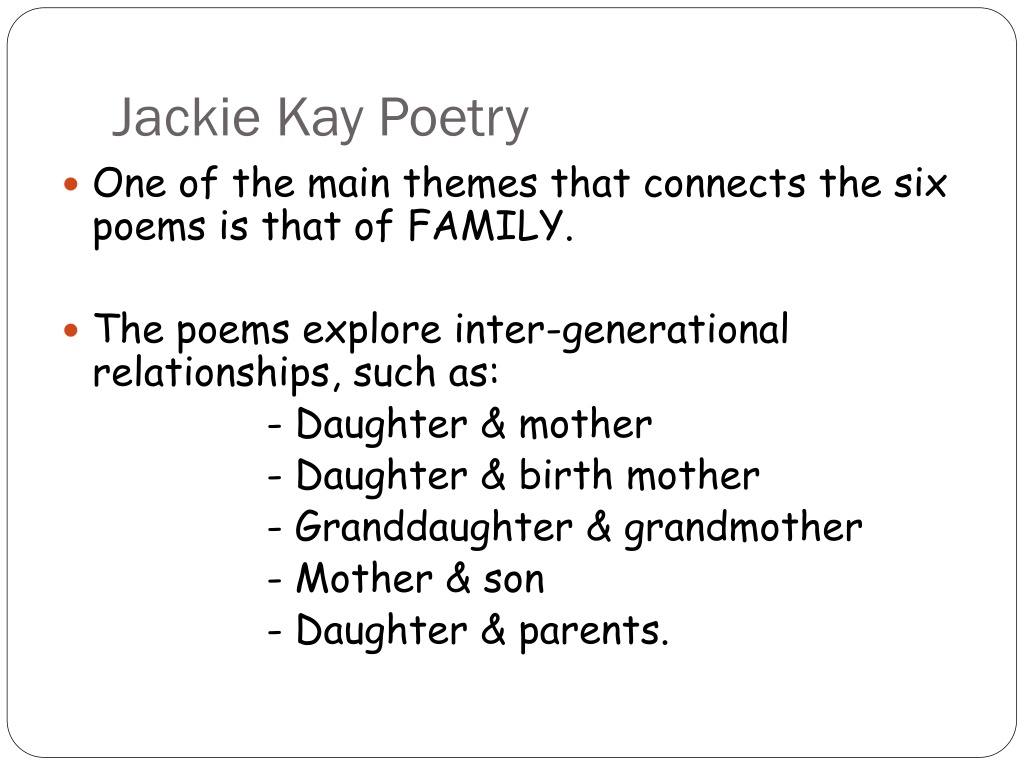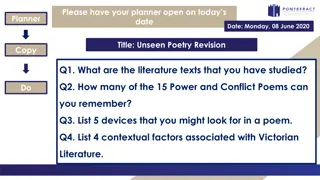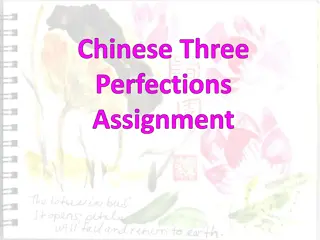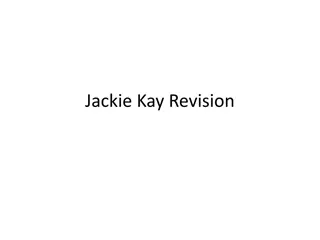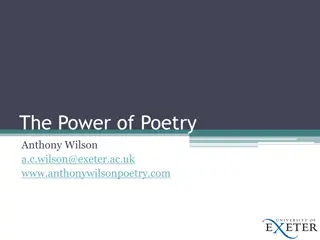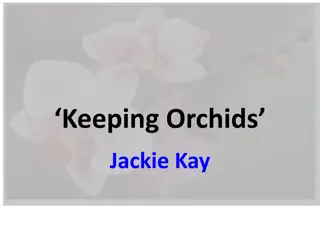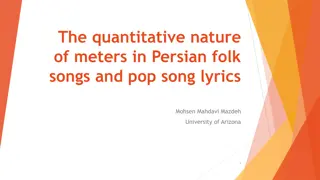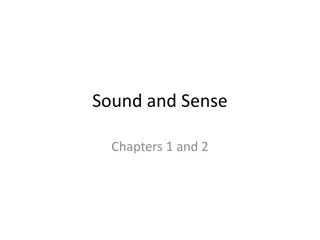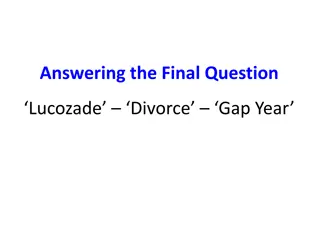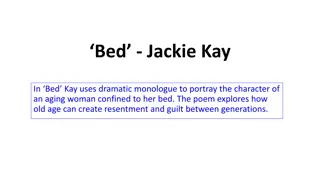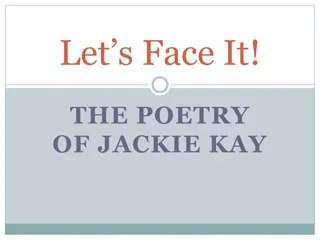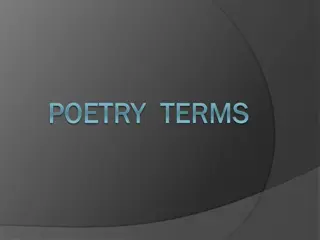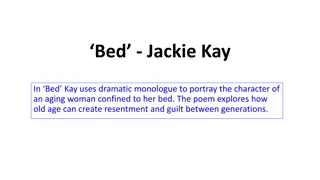Exploring Family Relationships in Jackie Kay's Poetry
The six poems by Jackie Kay delve into inter-generational relationships, focusing on themes of family dynamics such as daughter-mother, daughter-birth mother, granddaughter-grandmother, mother-son, and daughter-parents. The poems feature a strong female persona exploring domestic discourses. "Divorce" presents the serious issue from a child's perspective, highlighting the lacking familial relationship with humor and poignancy. "Sonnetesque" subverts expectations by portraying a child's separation from parents in a dramatic and ironic tone. Each poem offers a unique exploration of family bonds and dynamics.
Uploaded on Sep 27, 2024 | 0 Views
Download Presentation

Please find below an Image/Link to download the presentation.
The content on the website is provided AS IS for your information and personal use only. It may not be sold, licensed, or shared on other websites without obtaining consent from the author. Download presentation by click this link. If you encounter any issues during the download, it is possible that the publisher has removed the file from their server.
E N D
Presentation Transcript
Jackie Kay Poetry One of the main themes that connects the six poems is that of FAMILY. The poems explore inter-generational relationships, such as: - Daughter & mother - Daughter & birth mother - Granddaughter & grandmother - Mother & son - Daughter & parents.
Poetic Voice The voice is the point of view that a poem is seen from, like a narrator or persona. The poems feature the voice of a female persona (although Lucozade is a little more unclear). This female persona explores family relationships as a result, all offer a thoroughly domestic discourse or series of ideas.
Divorce Summary Points This is a light-hearted poem which deals with the serious issue of divorce from an unusual perspective. The speaker, a young child, voices her concern about her parents relationship and that of hers with them. She appears to be reacting to a situation which has occurred at home. During this she has obviously stormed off after having been chastised. She then seems to calm down and starts to imagine how other children s parents act towards their offspring. Through this reverie we learn about what is lacking in her familial relationship. The poem then ends with the child assuming a more accusatory and demanding stance.
Divorce Significant Aspects Dramatic monologue Two stanzas, each of fourteen lines Rhyming couplet at the end of each stanza Contrasting tones between stanzas Humorous, sad and poignant Main themes: relationships, identity and belonging, growing up, emotions Contrast between child s and adults world
Sonnetesque (twice) in form alludes to the precision and formality of the form. Parodic imitation of a teenage strop. Speaker is dramatic and pompous there are things I cannot suffer any longer ; I would be better off in an orphanage. Ironic reversal in roles sees the parents as being rough and wild ; carries out chores without thanks in the way a parent typically would. Title - expectations are subverted; this is not about the breakdown of a marriage, but the separation of a child from their parents. Stanza 2 shift in tone from the grandiose to something softer and more perceptive. Uses imagery to convey fantasies of the perfect parents repetition of there are only serves to emphasise that this fantasy is unrealistic and does not exist.
Annotation Line 1-3: Establishes expectation, created by title, that poem will be about a married couple. Lines 5- 8: IRONIC role reversal. Parodying the stereotypical complaint from mother to child that her daily housework goes unnoticed and unthanked. Lines 9-10: PUN on camel and gives me the hump
Lines 11-12: all you ever say - suggests perhaps the speaker is prone to strops like this regularly. Cheerful voice of father contrasts with stroppiness/seriousness of speaker Lady Muck - suggests speaker is seen as over the top by father Line 13: IRONIC role reversal- sounds like something a parent would say to a child. Line 14: Overblown, theatrical, OTT Imitative of what teenagers say when fighting with parents Echoes idea of rejecting parents altogether- divorce of the title
Line 15: Blunt tone created by simple declarative statement. Marks a shift in tone- second stanza becomes more calm in tone. Lines 16-23: Series of perfect images of parents Language echoes the fantastical descriptions of fairytales, children s stories or nursery rhymes- underscores the speaker s juvenile naivety and lack of unworldly understanding. Repetition of there are parents is ironic: there aren t. These parent s are unrealistic and idealised.
Line 24: OTTtone returns Short, declarative statements convey pomposity Line 25: Unlikely description of parents as rough and wild and always shouting. Contradicted by the father s words which give an impression of a good-humoured man. Irony- the speaker is the one coming across as rough and wild. The accusative address of the poem suggests it might ne shouted at the parents.
Line 27: Suggests an unshakeable certainty about right and wrong- reflects naivety/limited world experience. Line 28: Grand/dramatic ultimatum. Mention of morning and first light implies that in the morning all will be forgotten.
Gap Year Summary Points The speaker of this poem can be said to be Kay herself as it is dedicated and addressed to her son Matthew. She starts by reminiscing about her pregnancy and the subsequent birth of her son. She then flashes forward by eighteen years and her current situation: she is alone at home whilst her son is on a gap year. We learn that she accepts this pursuit but that it saddens her as there is now a vacuum in her life. Her own father s voice punctuates her thoughts with his concerns and this voice of reason, in Scots Language, highlights the gap across the generations as well as the geographic distance. Kay expresses her pride and joy about her son being mature and making his own way in the world. Reference to the baby basket, which frames the poem, focuses on the fact that her maternal instincts will always be part of her..
Gap Year Two sections: section 1 has four stanzas of four lines; section 2 has eleven stanzas of four lines and a twelfth stanza of one line Variety of tones Flashback and flash-forward Standard English and Scots Language Main themes: relationships, birth, identity, memory, estrangement, new horizons, growing up
Gap Year Questions for discussion: Look at the first stanza. What feelings does the poet have as she awaits her sons birth? Name the language techniques used in the following phrases: tight tub of a stomach ; turning, burping, awake, asleep ; and say how effective these expressions are in describing the expectant mother s experience. What does the phrase close stranger tell us about the poet s feelings about her unborn child? How does the poet link the two sections of the poem? What is the poet s first reaction to the grandfather s blunt advice? How does she react to the news that he will be returning four weeks later than expected? The last two stanzas signal a further mood change. Comment on the effectiveness of the language the poet uses to convey her feelings. Comment on the poet s word choice in the phrase a flip and a skip ago . What is she trying to emphasise? 1. 2. 3. 4. 5. 6. 7. 8.
8 mark Question Example Both Lucozade and Divorce focus on relationships with parents. In Lucozade the speaker is worried and caring towards their mother but in Divorce she wants to be separated from her parents. In Lucozade the phrase I am scared my mum will die reveals that the speaker is worried and therefore suggests a caring relationship. In Divorce the speaker says I want a divorce showing that she is angry towards her parents and wants to stop being part of the family. Also the speaker describes her parents as rough and wild illustrating that she thinks they are different to her and unpleasant which shows that she does not like them. 1. 2. 3. 4.
My Grandmothers Houses Brief Summary The speaker of the poem is a young child who is reminiscing about visits to her grandmother s houses. The grandmother once lived in a tenement property and was displaced (as part of the urban renewal programme mid 20thCentury) to a high rise property. The child also mentions the houses her gran cleans for a living and their regular visits to church: God s house. The grandmother is defined by these houses and knows her place in society. Unlike the child, she is ignorant of the superficiality and inherent racist attitudes of those around her. The poem is framed with ideas of death and illness which are always on the periphery of our lives.
My Grandmothers Houses Significant Aspects Monologue Related in present tense Three sections each with stanzas of varying lengths Conversational Free verse Main themes: relationships, displacement, class division, illness and death, transient nature of life
Tasks Mindmap/List the following information Explain what this poem is about in 5 bullet points How does the speaker feel about her grandmother and the way she has been treated? What do you learn about the grandmother/her personality?
Questions on: My grandmothers houses 1. Describe how the poet has structured this poem. 2. Comment on the content of the first and the last two lines, suggesting why the poet has chosen to start and endthe poem in this way. 3. Look closely at the poet s detailed descriptions of the tenement flat and the high-rise flat. What do they suggest about her grandmother s way of life and personality? 4. Choose 3 phrases which show that the child is reluctant to accompany her to church, and does not enjoy the experience.
How is My Grandmothers Houses similar to the other poems? Lucozade A young speaker Family relationships Focus on memories/the past Positive about family members Uses imagery Divorce Young speaker Family relationships Strong emotions Uses imagery Monologue
Keeping Orchids Summary Points The speaker of the poem is a daughter who is reflecting on a first meeting with her birth mother. The birth mother has given her flowers and these become a symbol of the relationship between the mother and child. The daughter is deeply upset during and after this meeting and refers to the basic information she has gleaned about her background but also indicates that there are many untold secrets. The meeting fades and quickly becomes an increasingly distant memory. Instead of gaining a sense of belonging, the speaker feels alienated and uneasy. The poem ends on a sinister note but she knows she has to move on. The orchids represent the fragility and transient nature of life and relationships.
Keeping Orchids p Significant Aspects Dramatic monologue Past and present tenses Flashback Symbolism Main themes: relationships, identity and belonging, memory, pain and suffering, secrets, adoption What is the poem about? What is the relationship between the characters like? List any words that sound sad. 1. 2. 3.
Lucozade p 138 Summary Points The title of this poem indicates that it will be about Lucozade, the traditional aid to recovery . Instead, it focuses on illness and the sixteen-year old speaker who is visiting her mum in hospital. She is clearly sad and upset about the whole situation and fears that her mum could die. As her mother recovers from her anaesthetic, she makes demands on the girl and requests that certain items be removed from her bedside locker and luxuries be brought to her instead. To the girl, this is an indication that her mother is recovering and she leaves in a much happier frame of mind. However, the ending is ambiguous and could be read either as the mother making a recovery or that this has been the final visit.
Lucozade Significant Aspects Seven stanzas of four lines each and a final single line Some rhyming patterns (end and internal) Present tense Dialogue, memory and ambiguity Nostalgic, humorous and sad Main themes: relationships, childhood, nostalgia, illness and death
Bed pp 148-149 Summary Points Despite the monosyllabic title Bed , the focus of this poem is on the speaker -an elderly, bedridden woman - who is cared for by her daughter. There has been a clear role reversal in this relationship with the daughter now taking care of her mother s every need. The speaker acknowledges that she is a burden to this young woman and this is confirmed by the fact that communication between the two has broken down. The elderly woman is only able to experience the outside world from her window and bemoans the fact that she is trapped in her bed. She is merely waiting to die and is understandably bitter and resentful.
